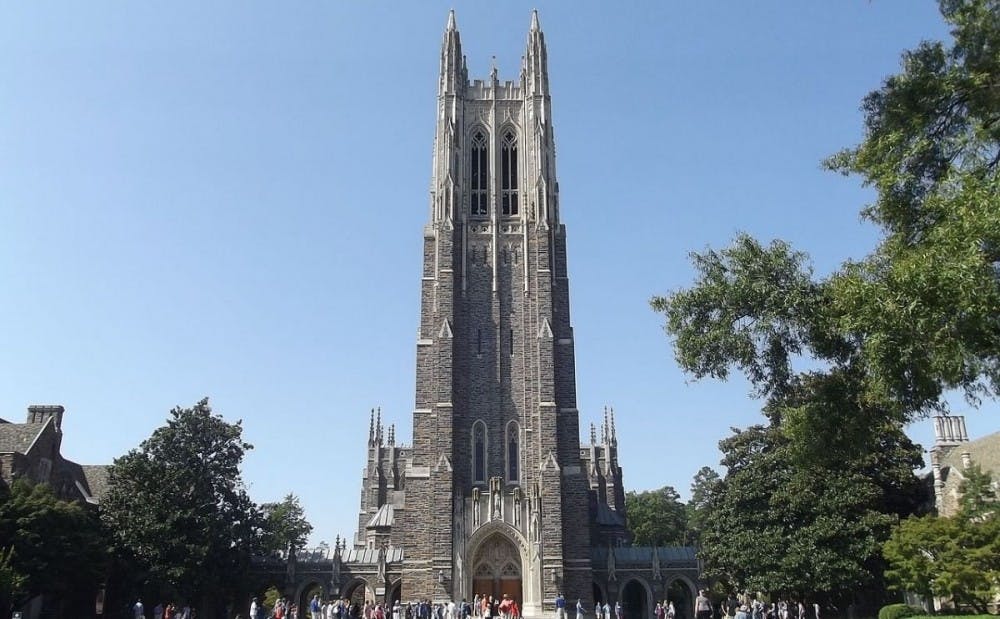As a Duke student, getting flooded with emails is something I’m familiar with. But as a senior this year, a new type of email has made its way into my inbox: emails about giving to Duke. We are asked repeatedly to donate money, with incentives including Chapel climbs, being able to pick where our money goes, and the refrain that even one dollar counts.
But money is not the only way to give to Duke, and it should not be treated as such.
Last semester, I attended a Senior Student Leaders Dinner at the Washington Duke. It was presented as an opportunity to talk with notable administrators about “what it means to be engaged alumni.” While the event was well-executed, I quickly realized that “engagement” just meant donating money. And as the night went on and very few of the administrators or event organizers even asked me what leadership positions I even held on campus, it became clear that “leadership” was just a way to narrow down which seniors got an invite to dinner.
I am the first to admit that I have benefited greatly from philanthropy at Duke. Coming to Duke would not have been an option for me without the generous financial aid package I received. Once I got here, I participated in DukeEngage, study abroad programs and paid summer research activities that were not only been highlights of my Duke experience but impacted my worldview. Donations are indubitably important. Without them, students like me could not partake in the Duke experience, and the Duke experience itself would not be the same.
And I also know that 5 percent of the ranking criteria for the U.S. News and World Report college rankings is “alumni engagement,” the percentage of the graduating class that donates to the school. And staying high up in those rankings keeps our stock up as alumni in the job market, if only in our own psyche.
But to equate engagement with giving money paints an incomplete picture. For one, it feels weird and wrong that Duke is already asking for money when my parents just finished giving up a large chunk of their life savings so that I could go here. There is also the question of whether I fully agree with what Duke stands for. I absolutely want to support future students and help them have the most fulfilling and accessible college experience possible, but do I want to make a monetary contribution to an institution that refuses to enact a hate and bias policy to protect marginalized students? And yes, no one is asking me for an exorbitant amount of money. But to create great events for the senior class but only make them open to donors makes it feel like we are being bribed—you can come to a ball at the Nasher or climb the Chapel, but only if you pay us.
For me, there isn’t a clear reason why being solicited for money before I even graduate feels wrong. Duke has contributed so much to my self-development: intellectually, interpersonally and ethically. But the notion that my only value to the university now is as a potential financial resource feels hollow, like the strides I made here as a person are not as important as the financial contribution I can make once I leave.
One of the invaluable aspects of Duke is the alumni network we join. And it’s not just alumni who give money; it’s alumni who give time and energy. Duke alumni are very willing to talk to you about their jobs, give you advice and help you navigate the world beyond Duke. The alumna who did my alumni interview when I was a senior in high school still visits campus at least once a year and takes me out to dinner every time. These connections and their interpersonal nature are priceless, and they exist because of the positive experiences and fond memories these people have with their alma mater. There is a sense of pride that many feel when it comes to being a Duke graduate, and that camaraderie is not something money can buy.
Again, I understand that financial donations are crucial. I’m not suggesting that giving money to Duke is necessarily harmful. If you can give, and you want to, you should. But being guilt-tripped into giving does nothing to boost engagement. And to not consider the full scope of alumni engagement is to omit the importance of the alumni network and the human capital that it provides for current and former members of the Duke community.
If Duke has impacted you the way it has impacted me, then you should give to Duke. You can give by donating money toward scholarship programs that have impacted you. Give by taking the time as an alum to talk with undergraduates who are interested in your career trajectory. Give by working to actively make the world outside the Duke bubble a better place, doing so with the skills and disposition that Duke has provided you. But give because you care about Duke students, because you want the institution to do better, because you are proud of your alma mater. A $1 donation and a Chapel climb is not what it means to be meaningfully engaged.
Ethan Ahuna is a Trinity senior. His column usually runs alternate Tuesdays.
Get The Chronicle straight to your inbox
Signup for our weekly newsletter. Cancel at any time.

